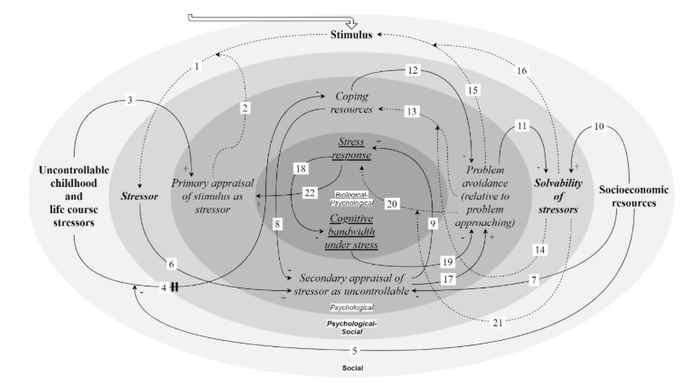3.6 Understanding the impact of exposure to adverse socioeconomic conditions on chronic stress from a complexity science perspective
Loes Crielaard, Mary Nicolaou, Alexia Sawyer, Rick Quax and Karien Stronks
Keywords: Socioeconomic status; Causal loop diagram; Chronic stress; Feedback loops.
Authors on the article:
Chronic stress increases chronic disease risk and is associated with adverse socioeconomic conditions. Such conditions often imply recurrent exposure to stimuli that cause stress, i.e. stressors. Chronic stress may therefore underlie the relationship between such conditions and adverse health outcomes.
Epidemiological studies concerning the effect of stressor exposure on health initially focused on finding a linear relationship between how many stressors people are exposed to and their emotional suffering caused by stressor exposure. However, it appeared that this relationship is nonlinear: across studies it was found that many times more stressors do not lead to more suffering and less stressors do not lead to less suffering.
Why is this relationship nonlinear? Feedback loops between stressor exposure and psychological processes, encompassing different temporal (acute stress response to repeated stressor exposure over the life course) and spatial (biological/psychological/social) scales could be part of the answer. For example, repeated stressor exposure can result in a constant background of chronic stress. This background may lead to stimuli being appraised as stressors – because they are more threatening given the circumstances. This results in an amplifying feedback loop.
In this paper, we therefore studied biological, psychological and social factors interacting with each other over the life course to examine the dynamics underlying the relationship between adverse socioeconomic conditions and chronic stress from a complexity science perspective.
We developed a causal loop diagram (CLD) to interpret available evidence from this perspective. The CLD was drafted by an interdisciplinary group of researchers. Evidence from literature was used to confirm/contest the variables and causal links included in the CLD and refine their conceptualisation. Our findings were evaluated by eight independent researchers. Our methods might be relevant to others that study biopsychosocial systems from a complexity science perspective.
We found that adverse socioeconomic conditions imply an accumulation of stressors and increase the likelihood of exposure to uncontrollable childhood and life course stressors. Repetition of such stressors may activate mechanisms that can affect coping resources and coping strategies and stimulate appraisal of subsequent stressors as uncontrollable. We identified five feedback loops describing these mechanisms: (1) progressive deterioration of access to coping resources because of repeated insolvability of stressors; (2) perception of stressors as uncontrollable due to learned helplessness; (3) tax on cognitive bandwidth caused by stress; (4) stimulation of problem avoidance to provide relief from the stress response and free up cognitive bandwidth; (5) susceptibility to appraising stimuli as stressors against a background of stress.
This paper can be of interest to others that aim to use CLDs to explicate interactions between social structures and individuals and to deduce implications for policy. In our case, interpreting available evidence from a complexity science perspective clarifies that in order to reduce chronic stress, it is necessary for interventions to address adverse socioeconomic conditions and psychological processes simultaneously – because stressors and psychological processes are constantly interacting in complex ways. This is an important finding, as generally interventions aiming to improve circumstances are implemented separately from interventions aiming to improve how individuals cope with stressors.

Crielaard L, Nicolaou M, Sawyer A, Quax R, Stronks K. (2021) Understanding the impact of exposure to adverse socioeconomic conditions on chronic stress from a complexity science perspective. BMC Medicine Dec;19(1):1-20. https://doi.org/10.1186/s12916-021-02106-1